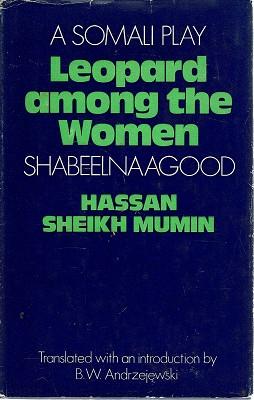
Leopard among the Women is a Somali play by hassan sheikh mumin. it is the first somali play to be translated into the english language and hassan sheikh was credited for being one of the major forces behind the golden age of Somali theatre. you can access the book for free from this link:
https://archive.org/details/leopardamongwome00hass
hassan sheikh mumin passed away 12 years ago in oslo. here is a little more on the playwright:
The mid-1960s to the mid-1970s has been described as the golden age of Somali theatre, and one of the major forces behind this was the poet and playwright Hassan Sheikh Mumin.
Born in the coastal town of Zaila in what was then the British Protectorate of Somaliland, he moved to Boorame when he was nine, where he completed his Koranic and elementary education. This was a time of political upheaval in the Horn of Africa and once the British regained the territory after a brief occupation by Italy in 1941, they allowed Somali political organisations to be established which led to the founding of the Somali Youth Club in 1943; this became the Somali Youth League in 1947.
With a personal commitment to independence and social and political change, Hassan joined the party, and it was for a rally in Boorame in the early 1950s that he composed his first public poems. What he has called his "first-born" poem begins with, "Dadaala Soomaaliyaay!" ("Oh Somalis, strive!"), and in another for the same event he addresses education with the refrain "Carruurta wax bara!" ("Educate the children!").
At this time, Hassan was making a living variously as a trader, a teacher and as a tailoring instructor, but, after independence in 1960, he was employed (between 1965 and 1968) by Radio Mogadishu as a poet, reciter and playwright, a new departure for Somali artists who until then had not been paid in any formal way for their work. After 1968 he was part of the Cultural Department of the Ministry of Education and continued to compose poems and plays, in what was still essentially an oral tradition, and to broadcast on the radio.
As the military regime of Mohamed Siad Barre, which came to power in 1969, became more repressive of artistic expression critical of it or how things were in the country, poets, playwrights and writers were censored or imprisoned and some chose to leave. Hassan moved from Mogadishu to the neighbouring country of Djibouti and then later returned to Boorame. Here he continued to compose poems and plays, but it is for his early plays that he is particularly remembered.
Of these Shabeelnaagood (1968) is regarded by many as his masterpiece and is the only Somali play to have been translated into English, as Leopard Among the Women by B.W. Andrzejewski (1974). In this, he engages with the way in which women in the towns were subject to predatory male attention as referred to in this extract which was sung by Shallaayo, the heroine, who has been tricked into a false marriage by the Leopard of the title:
Women have no share in the encampments of this world
And it is men who made these laws, to their own advantage.
By God, by God, men are our enemies, though we ourselves nurtured them
We suckled them at our breasts, and they maimed us:
We do not share peace with them.
In tackling this issue, aspects of traditional Somali life, which had been eroded by growing urbanisation are championed, along with progressive social reform in relation to the status of women and the importance of education. Further social issues are handled in the other early plays and later work, and for this, as well as for his wonderful and innovative use of their language, Hassan is fondly remembered by Somalis, wherever they are.
https://www.independent.co.uk/news/...mumin-poet-reciter-and-playwright-800543.html

